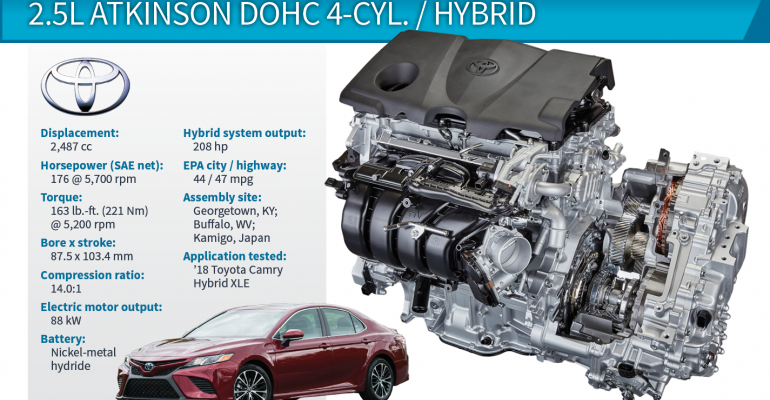Hybrid powertrains are complicated.
To work well requires an elaborate choreography between the electric motors, the internal-combustion engine and the automatic transmission, precisely dictated by complex software algorithms and executed in terms of nanoseconds by sophisticated computer controls.
One misstep can be detected behind the wheel as easily as an out-of-sync dancer in a Broadway chorus line.
So when we see one that works as effortlessly, seamlessly and consistently as the new Toyota Camry Hybrid, we’re impressed.
Start with the car’s core, the new 2.5L 4-cyl. that serves as the base engine for most Camry models and was a 2018 Wards 10 Best Engines contender in its own right. The “Dynamic Force” Atkinson-cycle 4-cyl. and redesigned Camry are part of Toyota’s New Global Architecture. Paired with hybrid componentry, the 2.5L achieves 41% thermal efficiency – a benchmark by any definition for an internal-combustion engine.
Advancements include laser-cladded valve seats, optimized exhaust-gas recirculation, re-engineered intake-port geometry for better “tumble” and an electrically driven heating element to control the thermostat. Two balance shafts help mitigate noise and vibration, and weight was reduced for the head cover, block, crankshaft, camshafts, connecting rods and springs.
Though detuned somewhat in the hybrid application, the 2.5L still puts out a solid 176 hp and 163 lb.-ft. (220 Nm) of torque.
Compensating for the skin-back on internal-combustion horsepower is a 99-kW (118-hp) electric motor that delivers 149 lb.-ft. (202 Nm) of peak torque to give the Camry additional jump off the line or a turbo-like power boost to pass on the highway. The combined output of 208 hp is delivered to the front wheels through a CVT with Toyota’s “Sequential Shiftmatic” technology that allows paddle shifting through six virtual gears if you want to hike the fun quotient a bit.
A higher-mileage-focused Camry Hybrid LE can be had that features a more energy-dense lithium-ion battery, but our well-equipped XLE tester featured a nickel-metal-hydride pack that proved more than good enough for us.

Rated at 46 mpg (5.1 L/100 km) city/highway combined, we nailed that mark on some of our around-town commutes and never logged less than 40 mpg (5.9 L/100 km). Helping achieve those numbers is a new feature called Auto Glide Control that is activated when the car is in eco mode, reducing engine braking to allow the Camry to coast more freely – and economically – when approaching a stop.
More important to us in a climate of relatively cheap gasoline, we didn’t feel we were paying the price in lost performance or had to compromise on packaging in this roomy, midsize sedan. We like the Camry Hybrid’s new sport driving mode a lot. It quickens the response to accelerator inputs and pumps up power delivered to the wheels, helping remind us a hybrid doesn’t have to be all about fuel economy all of the time.
Sport mode or otherwise, “the ICE engine works seamlessly with the electric motor for strong, creamy power delivery,” notes one judge. “Excellent power and torque in addition to Prius-like fuel economy.”
Weight also is nicely balanced in the Camry Hybrid, so there’s none of that tail-dragging feeling that has plagued other hybrids of the past.
In judging for 10 Best Engines, we look for powertrains that go hand-in-glove with the vehicle. This one checks that box. High mileage, smooth delivery and ample power to pass are what most buyers look for in a family-hauling, no-compromise midsize sedan.
“There are no awkward transitions between ICE and EV power, and the vehicle does a great job of telling you what is happening with real-time graphic displays,” marvels one editor.
“Forty mpg from a 200-hp engine is hard to find fault with,” sums up another.
[email protected] @DavidZoia



